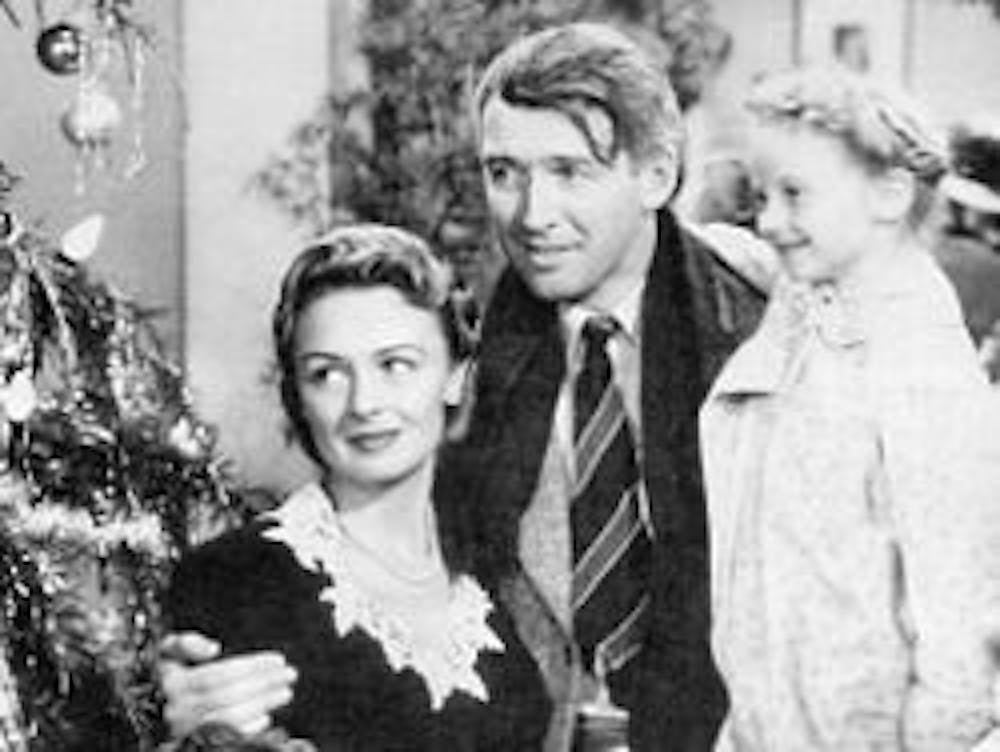You know the most wonderful time of the year has arrived when “All I Want for Christmas Is You” dominates the airwaves, the temperature seems to drop by 10 degrees a day and Fox News gears up to combat the so-called “war on Christmas” that apparently plagues toy stores and cinemas across the country. As bank account balances plummet and heating bills skyrocket, we can at least find solace in what the PC police have dubbed “holiday movies,” which either serve as a rare reminder of the “reason for the season” or as a dose of outrageousness and hilarity.
The 1930s and ‘40s saw the creation of the traditional Christmas movie, which tended to blend spiritual stories and real-world romances to construct accessible tales that suited the tastes of the time without losing sight of their religious origins. Take for instance one of the era’s most critically and commercially successful yuletide entries, It’s a Wonderful Life. The Jimmy Stewart classic affirms the value of the everyman as a force of moral good and familial leadership in an increasingly hostile world of growing class divisions. Films such as It’s a Wonderful Life discuss social justice, love and commitment within a Christian framework, but the ideal vision they present can play well with viewers of any faith or creed.
Slightly more problematic are the Christmas TV specials that began to spring up at the start of the ‘60s. Made-for-TV classics such as A Charlie Brown Christmas and The Little Drummer Boy demonstrate an earnest attempt on the part of Christian filmmakers to reclaim a holiday that seemed at the time to be tilting toward secular status.
Contemporaneous offerings such as Rudolph the Red-Nosed Reindeer, Frosty the Snowman and Santa Claus is Comin’ to Town mark awkward efforts at replacing Christmas’ religious roots, symbols and stories with a new set of icons, figures and tales that have nothing to do with the holiday’s Christian origins. The distinctively Christian Saint Nicholas was molded into the secular Kris Kringle, receiving a commercialized, fairy-tale backstory that distanced him from any semblance of sainthood.
Despite attacks from the Religious Right against the apparent ‘godlessness’ of secularized Christmas stories and specials, films such as How the Grinch Stole Christmas and Frosty actually broadcast messages of peace, hope, love, charity and thanksgiving, all of which arguably stand at the core of Christian theology.
For better or worse, the rise of slasher films and bawdy comedies in the ‘70s and ‘80s resulted in the decline in this sort of joyful holiday fare in favor of ironic and irreverent takes on Christmastime. As the 1984 classic Gremlins demonstrates, nothing says yuletide cheer like murderous monsters and horny teens. As the ‘80s progressed, images of angels and nativity scenes in mainstream holiday films fell by the wayside, replaced by visions of Die Hard’s besieged Nakatomi Plaza and the exploding turkey and supersized tree from National Lampoon’s Christmas Vacation.
These gory horror films and black comedies don’t exactly make for ‘Ho-Ho’-wholesome family fun, but they do provide enough laughs and scares to spice up the holiday season, and they come across especially well when compared with the slew of schlock that has followed them.
The early ‘90s stood strong as the last bastion of top-tier Christmas films, combining sweet moral lessons about the value of family and faith with high-stakes entertainment in movies such as Home Alone, The Muppet Christmas Carol and the remake of Miracle on 34th Street.
Sadly, this trend came to a quick and decisive end when the eternally obnoxious Jonathan Taylor Thomas opted to team up with box-office bomb Jessica Biel in 1998 to spawn the sickeningly sweet and even more sickeningly stupid I’ll Be Home for Christmas, an unwatchable road movie that makes Jingle All the Way look like A Christmas Story by comparison.
Through films like this Biel vehicle, as well as the whole collection of Lifetime Original Christmas movies, most of which revolve around siblings of Santa or women who crawl through their dryers to reach the North Pole, filmmakers have effectively killed the Christmas movie. Even a charming throwback like last year’s Arthur Christmas can do little to buck the trend. It’s easy to complain about the alleged overzealousness of the Religious Right this time of year, but if putting the ‘Christ’ back in Christmas means trading Shrek the Halls for It’s A Wonderful Life, we may all benefit from taking a step in that direction.







